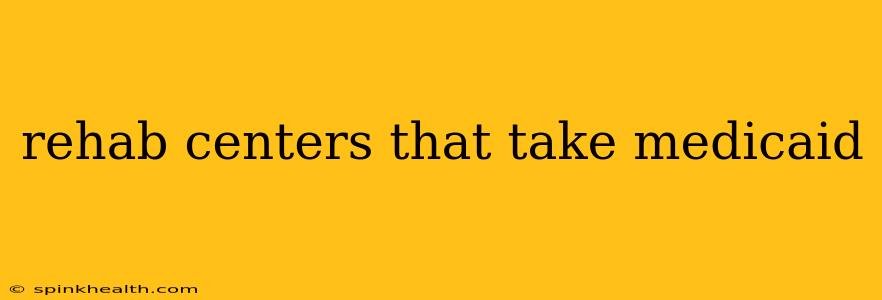The journey to recovery from substance abuse or mental health challenges is a deeply personal one, and finding the right treatment center is a crucial first step. For many, access to quality care hinges on insurance coverage, specifically Medicaid. This guide aims to illuminate the path to finding rehab centers that accept Medicaid, addressing common concerns and offering practical advice.
My name is Sarah, and I've spent years working in addiction recovery support. I've witnessed firsthand the struggles individuals face in accessing appropriate care, particularly when financial limitations are involved. This article is born from that experience, a commitment to helping individuals find the help they need.
What is Medicaid, and How Does it Cover Rehab?
Medicaid is a joint federal and state program that provides healthcare coverage to millions of Americans, including those with low incomes, disabilities, and pregnant women. While the specifics vary from state to state, Medicaid generally covers a range of substance abuse and mental health services, including inpatient and outpatient rehab programs. However, it's crucial to understand that coverage isn't universally guaranteed for all treatment options at all facilities.
How Do I Find Rehab Centers That Accept Medicaid in My Area?
Finding a rehab center that accepts your specific Medicaid plan can feel overwhelming. Here's a step-by-step approach:
1. Contact Your State's Medicaid Office:
This is your first and most important step. Your state's Medicaid office maintains a list of providers within their network. They can provide you with a directory of rehab centers that accept your specific Medicaid plan. You can usually find contact information on your state’s government website.
2. Utilize Online Search Engines Strategically:
While online searches can be helpful, be specific! Use keywords like "Medicaid-approved rehab centers [your city/state]", or "rehab centers that accept [your specific Medicaid plan]". Be cautious of websites promising immediate admission or using high-pressure tactics.
3. Check with Local Hospitals and Community Health Centers:
Many hospitals and community health centers offer substance abuse and mental health services and often have strong connections with rehab facilities within their networks. They can provide valuable referrals and guidance.
4. Explore SAMHSA's National Helpline:
The Substance Abuse and Mental Health Services Administration (SAMHSA) offers a national helpline (1-800-662-HELP (4357)) that can provide confidential referrals to treatment facilities in your area, including those that accept Medicaid.
What Questions Should I Ask Potential Rehab Centers?
Once you've identified potential centers, asking the right questions is vital.
What types of insurance do you accept?
This clarifies whether they accept your specific Medicaid plan and any limitations on coverage.
What specific services do you offer?
Ensure the facility offers the type of treatment you require (e.g., detox, inpatient, outpatient, dual diagnosis treatment).
What is your success rate?
While not a perfect indicator, understanding the center's track record can provide valuable insights.
Do you provide aftercare services?
Successful recovery often involves ongoing support. Inquire about their aftercare programs.
What are your admission procedures?
Understanding the admission process can help you prepare accordingly.
What If My Medicaid Doesn't Cover the Entire Cost of Rehab?
Even with Medicaid, you might face some out-of-pocket expenses like co-pays or deductibles. In such cases, explore options like:
- Financial assistance programs: Many rehab centers offer financial assistance to patients based on need.
- Grants and scholarships: Research available grants and scholarships that support addiction recovery.
- Fundraising: Consider fundraising efforts to bridge the gap.
Finding a rehab center that accepts Medicaid is a crucial step on the path to recovery. Remember to be proactive, thorough in your research, and patient. The right treatment center is out there; you just need to know where to look. Remember that seeking help is a sign of strength, and there are resources available to support you every step of the way.

